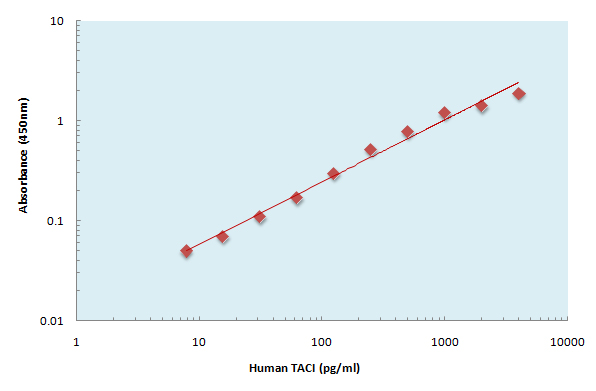- Home
- About
- Promotions
-
Products
-
Elisa Kits
- |
-
Primary antibodies
- |
-
Secondary antibodies
- |
-
Proteins
- |
-
IHC reagents
- |
-
WB reagents
- PonceauS Staining Solution
- PBST Washing Buffer, 10X
- 1.5M Tris-HCl Buffer, pH8.8
- 1M Tris-HCl Buffer, pH6.8
- 10% SDS Solution
- Prestained Protein Marker
- TBST Washing Buffer, 10X
- SDS PAGE Loading Buffer, 5X
- Stripping Buffered Solution
- Tris Buffer, pH7.4, 10X
- Total Protein Extraction Kit
- Running Buffer, 10X
- Transfer Buffer, 10X
- 30% Acr-Bis(29:1) Solution
- Tris电泳液速溶颗粒
- PBS(1X, premixed powder)
- TBS(1X, premixed powder)
- 快速封闭液
- 转膜液速溶颗粒
- Chemical reagents
- News
- Distributor
- Resources
- Contact
- Home
- >
- Info
- >
- Human TACI ELISA Kit
- >
- Go Back
Human TACI ELISA Kit
- Catalog No.:KE1063
- Applications:ELISA
- Reactivity:Human
- Protein Name:
- Tumor necrosis factor receptor superfamily member 13B
- Specificity:
- Sample Type for Cell Culture Supernates, Cell lysates, Tissue Lysates, Serum, EDTA Plasma, Heparin Plasma
- Storage Stability:
- 2-8°C/6 months
- Other Name:
- TNFRSF13B;TACI;Tumor necrosis factor receptor superfamily member 13B;Transmembrane activator and CAML interactor;CD antigen CD267
- Detection Method:
- Colorimetric
- Background:
- disease:Defects in TNFRSF13B are a cause of common variable immunodeficiency (CVID) [MIM:240500]. CVID is characterized by a deficiency in all immunoglobulin (Ig) isotypes. Individuals with CVID suffer from recurrent sinopulmonary and gastrointestinal infections and have an increased incidence of autoimmune disorders and of lymphoid and non-lymphoid malignancies. There is evidence for a global isotype switching defect in some individuals with CVID. But CVID is a complex and heterogeneous disease in which defects in B-cell survival, number of circulating CD27+ memory B-cells (including IgM+CD27+ B-cells), B-cell activation after antigen receptor cross-linking, T-cell signaling and cytokine expression have been observed.,disease:Defects in TNFRSF13B are a cause of immunoglobulin A deficiency 2 (IGAD2) [MIM:609529]. Selective deficiency of immunoglobulin A (IGAD) is the most common form of primary immunodeficiency, with an incidence of approximately 1 in 600 individuals in the western world. Individuals with symptomatic IGAD often have deficiency of IgG subclasses or decreased antibody response to carbohydrate antigens such as pneumococcal polysaccharide vaccine. Individuals with IGAD also suffer from recurrent sinopulmonary and gastrointestinal infections and have an increased incidence of autoimmune disorders and of lymphoid and non-lymphoid malignancies. In vitro studies have suggested that some individuals with IGAD have impaired isotype class switching to IgA and others may have a post-switch defect. IGAD and CVID have been known to coexist in families. Some individuals initially present with IGAD1 and then develop CVID. These observations suggest that some cases of IGAD and CVID may have a common etiology.,function:Receptor for TNFSF13/APRIL and TNFSF13B/TALL1/BAFF/BLYS that binds both ligands with similar high affinity. Mediates calcineurin-dependent activation of NF-AT, as well as activation of NF-kappa-B and AP-1. Involved in the stimulation of B- and T-cell function and the regulation of humoral immunity.,online information:TNFRSF13B mutation db,similarity:Contains 2 TNFR-Cys repeats.,subunit:Binds TRAF2, TRAF5 and TRAF6. Binds the NH2-terminal domain of CAMLG with its C-terminus.,tissue specificity:Highly expressed in spleen, thymus, small intestine and peripheral blood leukocytes. Expressed in resting B-cells and activated T-cells, but not in resting T-cells.,
- Function:
- leukocyte homeostasis, B cell homeostasis, lymphocyte homeostasis, negative regulation of immune system process,regulation of leukocyte activation, negative regulation of leukocyte activation, immune response, cell surface receptor linked signal transduction, negative regulation of cell proliferation, regulation of B cell proliferation, negative regulation of B cell proliferation, regulation of mononuclear cell proliferation, negative regulation of mononuclear cell proliferation,regulation of cell proliferation, homeostatic process, homeostasis of number of cells, regulation of lymphocyte proliferation, negative regulation of lymphocyte proliferation, regulation of B cell activation, regulation of cell activation,negative regulation of cell activation, negative regulation of B cell activation, regulation of lymphocyte activation,negative regulation of lymphocyte activation, regulation of
- Subcellular Location:
- Membrane; Single-pass type III membrane protein.
- Expression:
- Highly expressed in spleen, thymus, small intestine and peripheral blood leukocytes. Expressed in resting B-cells and activated T-cells, but not in resting T-cells.

- The Human TACI ELISA Kit allows for the detection and quantification of endogenous levels of natural and/or recombinant Human TACI proteins within the range of 16-2000 pg/ml.




